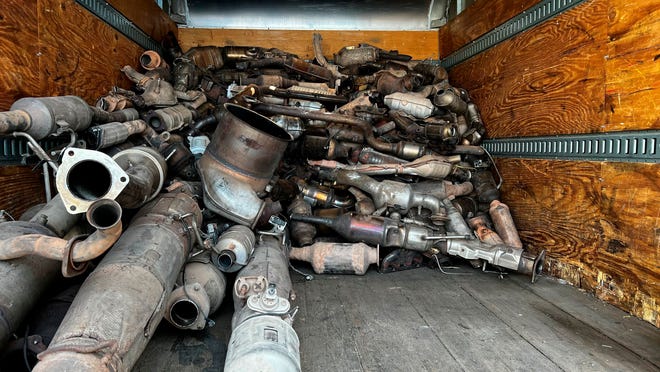What are catalytic converters? How to protect yours from theft.
Loud noises in the car are never a good sign and are particularly annoying when the cause of the noise is the lack of a catalytic converter.
Catalytic converters are regularly targeted auto parts that are sometimes stolen right out of driveways. Theft can cost car owners headaches and up to thousands of dollars.
Detectives in August 2022 identified a man who ran a $22 million catalyst trafficking operation based in Oregon and spanning six states. A jury charged a dozen people with racketeering, grand larceny and money laundering, among other charges.
What are catalytic converters and why are they stolen so often?
Catalyst theft:10 vehicles most likely to be targeted and what the police are doing about it

What are catalysts?
With catalytic converters, your car filters out harmful engine exhaust gases. This exhaust system converts pollutants (hydrocarbons, carbon monoxide and nitrogen oxides) into compounds that already make up our atmosphere (nitrogen, oxygen, carbon dioxide and water).
Well-designed catalytic converters can reduce hydrocarbon and carbon monoxide emissions by around 90% and diesel particulate emissions by 25-35%. These converters use metallic catalysts to drive reactions at lower temperatures than would normally be required.
Per Environmental Protection Agency guidelines, cars manufactured in 1975 or later have catalytic converters to help curb pollutants. According to the EPA, as of 1988, anyone who installs or sells a catalytic converter that does not meet federal guidelines could face penalties of up to $25,000 for each installation.
Some states have even enacted stricter environmental protection regulations for catalytic converters. The California Air Resources Board requires CARB-compliant catalytic converters that use an improved process to meet more stringent standards to reduce harmful emissions. In California and Colorado, all cars must use CARB compliant catalytic converters. New York State requires cars manufactured in 1993, 1994, 1996 and newer to use the catalytic converters, and Maine requires CARB-compliant catalytic converters for cars manufactured in and after 2001.
Why are catalytic converters stolen?
Reported catalytic converter thefts increased by 325% between 2019 and 2020. The reason for stolen catalytic converters is the explanation for each theft – money. The rhodium, palladium, and platinum used in these parts are valuable, and rhodium can be sold for $20,000 an ounce, according to the National Insurance Crime Bureau. Palladium costs nearly $3,000 an ounce and platinum costs about $1,128 an ounce.
Twenty-six states proposed legislation to prevent catalytic converter theft in 2021, with ten states passing legislation.
NICB recommends taking precautions to prevent your catalytic converter from being stolen:
- Install an anti-theft device.
- Park trucks in a well-secured enclosed area.
- Park private vehicles in a garage or driveway with motion sensor security lights. Always lock your car.
- Have your vehicle identification number etched on your car’s catalytic converter, which helps law enforcement track and identify the stolen parts. This can be done at a muffler shop or at a local NICB catalyst event.
In the market for a new car?:How Much You Should Spend.
Can you drive without a cat?
If your catalytic converter has been stolen, you may receive an engine trouble code from your vehicle. Because the converter muffles the exhaust noise, you’ll also notice a louder, more unusual sound coming from the exhaust, reports TheMotorGuy.com.
While driving without a catalytic converter is technically possible, legal issues may arise if you live in a state that requires emissions testing to use the vehicle. Federal law also prohibits the removal of catalytic converters.
How much does it cost to replace a catalytic converter?
For replacement transducers, prices vary based on part fitment. Universal replacements can cost around $200-$300, according to AutoZone, but newer vehicles may require on-board converters since the original equipment catalytic converters are integrated into the exhaust manifold. These direct-fit converters can cost as much as $2,500.
Do it yourself:5 simple tips for car care.
Just curious?:We are here to answer life’s everyday questions